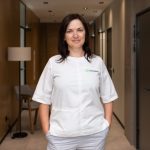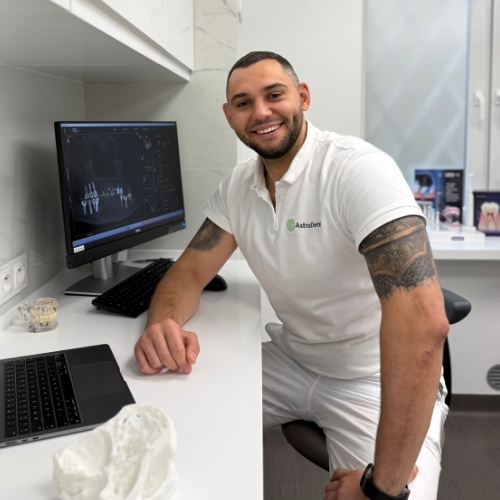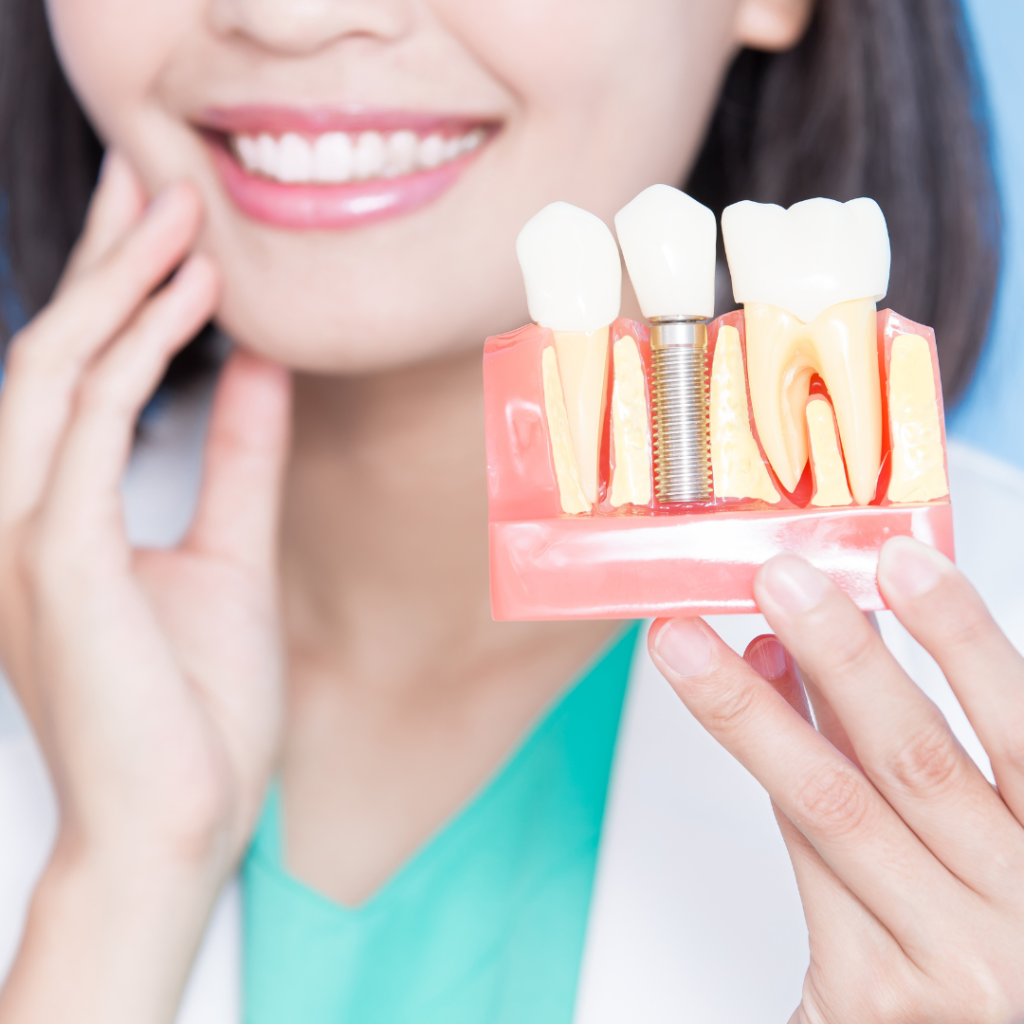Peri-implantitis – how to save the implant and gum health in Warsaw
Peri-implantitis is inflammation of the tissues around a dental implant, which is accompanied by loss of bone support. The disease develops under the influence of bacterial plaque, mechanical overload, and errors at the prosthetics stage. According to the European Federation of Periodontology, the risk of peri-implantitis 5 years after implantation is 20-22%, and without treatment leads to the loss of the artificial tooth root.
Ignoring the problem can result in complications: the bone collapses, the gums recede, the implant becomes loose. Self-administration of antiseptics or painkillers masks the symptoms, but does not stop pathological changes. Peri-implantitis treatment at Astra Dent in Warsaw is carried out according to international standards: 3D diagnostics, ultrasonic cleaning of the implant surface, laser sanitation, regenerative membranes and osteoplastic materials are used. A comprehensive approach allows you to save the implant, restore tissues and restore structural stability.
Why do patients choose peri-implantitis treatment at Astra Dent Warsaw?
Peri-implantitis treatment is always a challenge, since it is not about eliminating inflammation, but about preserving the complex system "bone-implant-orthopedic superstructure". Therefore, patients look for dental centers that employ narrow-profile specialists, have modern equipment and use protocols proven by international practice.
Advantages of peri-implantitis treatment at Astra Dent:
- Experienced implantologists and periodontists. The dental center employs doctors who have specialized in working with implants for over 25 years, are certified by Straumann, Neodent, Nobel Biocare, MegaGen and other global systems. They know how different implant surfaces behave during inflammation, and are able to choose a cleaning and sanitation scheme.
- Modern equipment for diagnostics and treatment. 3D cone-beam tomography (CBCT) is used to assess the volume of bone tissue, intraoral scanners for planning the intervention, microscopes to monitor the cleanliness of the working field, ultrasonic scalers with implant attachments, as well as diode lasers for contactless sanitation. Modern technical arsenal reduces the risk of errors and accelerates healing.
- A comprehensive approach – from analysis to rehabilitation. First, a photo protocol and anamnesis are taken, then an assessment of the condition of bone and soft tissues is performed. After sanitation, an individual observation schedule is selected, hygiene recommendations and, if necessary, plans for restoring lost bone (bone grafting, membranes).
Astra Dent specialists work with complications after implantation in other countries. They have experience working with implants from different manufacturers, conduct revisions of structures, change abutments and develop individual plans to save the situation.
Causes of peri-implantitis
To develop a treatment plan, it is necessary to understand exactly what triggered the inflammation near the implant. Peri-implantitis is always the result of a combination of factors that disrupt the stability of the structure:
- Non-hygiene. Bacterial plaque accumulates around the implant, which penetrates the gums and causes inflammation. Without thorough cleaning with a toothbrush, floss, and interdental brushes, the area near the artificial tooth root becomes a source of chronic infection.
- Smoking. Nicotine reduces microcirculation in tissues, slows down healing, and reduces oxygen access. The risk of peri-implantitis in smokers is twice as high as in non-smokers due to a deterioration in the immune response.
- Improper implant placement. If the insertion angle is violated during implantation, the volume of bone, or the quality of soft tissues is not taken into account, microspaces are created in which bacteria accumulate. Structures are overloaded more quickly and lose stability.
- Lack of regular professional care. Even with perfect home hygiene, preventive visits are necessary to remove subgingival plaque, polish surfaces and monitor the condition of the gums. Without this, inflammation develops imperceptibly and progresses.
The Astra Dent team selects an individual prevention schedule and gives precise recommendations for maintaining cleanliness around the implant. This is an important point for preventing relapses and preserving titanium prostheses for years to come.
Symptoms to look out for
Inflammation around the implant occurs unnoticed, and patients often do not suspect there is a problem. But there are several signs that indicate the development of peri-implantitis and require immediate diagnosis:
- Redness, bleeding gums. The soft tissues around the implant become swollen, sensitive, and bleeding occurs even during light brushing, which indicates a reaction of the gums to bacterial plaque.
- Bad breath. Chronic inflammation is accompanied by the release of volatile compounds that have a characteristic odor. The presence of odor after hygiene signals a deep pathological process.
- Implant mobility. Reduced stability means loss of bone support, which is a critical complication. The symptom requires urgent intervention, since the chance of saving the implant decreases with each passing day.
- Pain, pus, swelling. Severe pain, exudate, and severe swelling indicate an active infection. At this stage, not only rehabilitation is required, but also surgical correction.
It is important not to wait until the symptoms become obvious, because timely intervention allows you to stop the process without radical measures. Astra Dent specialists use microscopic control, lasers and regenerative materials to minimize tissue loss in advanced cases.
Why can peri-implantitis be dangerous?
Even a small inflammation around the implant threatens with serious consequences if it is not eliminated in time. Peri-implantitis affects not only soft tissues, but also the underlying bone, disrupts the stability of the structure, which can affect neighboring teeth.
Consequences of untimely treatment of peri-implantitis:
- Destruction of bone tissue. Infection stimulates the production of osteoclasts – cells that resorb bone. In a few months, the volume of bone mass around the implant decreases by 30-50%, which is why the structure loses functionality.
- Damage to neighboring teeth. Bacterial inflammation spreads to the periodontal tissues of nearby teeth, provoking their mobility and loss of bone support. A "domino" effect is created when one problem triggers a chain of others.
- Loss of the implant. If the zone of osseointegration (tight fusion of the implant with the bone) is lost, the screw becomes mobile and ceases to perform the function of support. Even minimal load leads to complete loosening of the artificial tooth root.
Timely intervention stops the pathological process at an early stage, without removing the implant. In complex cases, Astra Dent specialists use modern reconstruction methods – autogenous (patient’s own) or allogeneic (donor) bone materials, as well as synthetic biocompatible substitutes that stimulate the growth of new bone tissue.
Methods of treating peri-implantitis in Astra Dent Warsaw
The choice of treatment method depends on the stage of peri-implantitis, the condition of the bone and the type of implant. Astra Dent dentists use a multi-level approach that allows dentists to save the structure in the presence of serious complications.
Professional implant cleaning
Professional cleaning is an extremely important stage of treatment, without which it is impossible to achieve stabilization of the condition. A biofilm accumulates around the implant, consisting of bacteria, food debris, minerals and inflammation products. Simple cleaning is not able to completely eliminate pathogenic flora, so special equipment is required.
Astra Dent uses methods that take into account the anatomy of the implant and the characteristics of its surface:
- Ultrasonic scalers with implant attachments. Special attachments are made of titanium, carbon or polymers, which allow you to work on the titanium surface without leaving micro-scratches.
- Air-abrasive systems (air flow). Powders with glycine or erythritol particles are used, which gently remove plaque in hard-to-reach areas.
- Microscopic control. Cleaning is performed under magnification, which allows the doctor to remove the biofilm without letting microscopic residues pass through.
- Hand tools. In hard-to-reach areas, special implant curettes are used, made of delicate materials that do not damage the surface.
After professional cleaning, the implant becomes suitable for further manipulations: application of antiseptics, laser treatment, surgical sanitation. Without high-quality mechanical cleaning, other methods will be ineffective, because bacteria remain hidden under a layer of mineralized plaque.
Antiseptic treatment and antibiotics
To reduce the bacterial load in the area around the implant, local antiseptic treatment is used, and in case of active infection, systemic antibiotic therapy. Astra Dent doctors select protocols depending on the degree of inflammation, depth of pockets and type of microflora:
- Local antiseptics. Solutions of chlorhexidine, povidone-iodine, sodium hypochlorite or hydrogen peroxide are used to treat periodontal pockets.
- Local antibacterial agents. Gels or liniments with metronidazole or chlorhexidine are used, which are applied directly to the affected area.
- Systemic antibiotic therapy. In case of acute inflammation or purulent process, broad-spectrum antibiotics are prescribed (for example, amoxicillin with clavulanic acid, metronidazole, clindamycin), selected according to the protocols of European periodontology.
- Sensitivity control of microflora. In difficult cases, bacteriological culture is performed to select the most effective drug.
Antibiotics alone do not solve the problem, but only support the main treatment and help reduce inflammation.
Laser therapy or vector therapy
If mechanical and antiseptic cleaning is not enough, technologies that work at the micro level are used. Laser and vector therapy remove residual biofilm, reduce the number of bacteria deep in the tissues and stimulate regeneration.
What does the laser or vector therapy stage include:
- Diode and Er:YAG lasers. Used for non-contact evaporation of biofilm and disinfection of micro-rough surfaces of the implant without overheating the tissues.
- Vector therapy. The system works on the basis of ultrasound and hydroabrasive flows with a special suspension that gently cleans the surface of the implant and pockets.
- Stimulation of regeneration. Laser action accelerates blood circulation, activates fibroblast cells and triggers regenerative processes in soft tissues.
- Combined protocols. In complex cases, the laser and Vector are used sequentially to achieve maximum effect.
Hardware methods reduce healing time and reduce the risk of complications, compared to traditional mechanical procedures.
Surgical rehabilitation or bone grafting
When conservative methods do not yield results, Astra Dent doctors proceed to the surgical stage. Interventions require high precision and are performed under a microscope or using an operating laser:
- Opening the gingival flap. The surgeon gains access to the implant surface, pockets and affected tissues for complete rehabilitation.
- Mechanical and laser cleaning. The implant surface and bone cavity are thoroughly cleaned of infected tissues, granulations and biofilm.
- Use of regenerative membranes. Biosoluble or barrier membranes are used, which direct the growth of new cells and protect the area from re-infection.
- Bone grafting. Autogenous, allogeneic or synthetic bone materials are introduced, which restore volume and stimulate osteogenesis (formation of new bone).
After surgery, the patient receives an individual rehabilitation program with control of each stage of healing. The combined approach ensures the stability of the structure for many years.
Implant preservation or replacement
If conservative treatment exhausts its capabilities, the question arises: is it possible to save the implant or is it necessary to replace it. Astra Dent specialists do not make a decision blindly, but rely on the analysis of clinical and radiological studies.
The stage of implant preservation or replacement includes:
- Stability assessment. The doctor checks the depth of the pockets, bone density, implant mobility and the level of osseointegration using CBCT (cone-beam tomography).
- Revision of the prosthetic part. If necessary, abutments, attachments or prostheses are changed to reduce the load on the problem area.
- Removal of the implant. If the structure cannot be restored, atraumatic removal is performed while preserving the maximum bone volume.
- Preparation for re-implantation. Bone grafting, membrane installation, and soft tissue regeneration are performed to prepare the area for a new implant.
Surgical interventions are planned in a multidisciplinary manner: the implantologist, orthopedist and periodontist work as a single team. An integrated approach ensures accurate planning and increases the chances of complete recovery.
Peri-implantitis prevention
Peri-implantitis prevention is a set of measures that allow you to maintain gum health, prevent the accumulation of biofilm and detect the first signs of inflammation. In order for the implant to serve for years and remain stable, you need:
- Regular professional cleanings. At least every 4-6 months, professional sanitation using ultrasonic scalers and air polishing is required. During the procedure, subgingival plaque is removed, which is inaccessible for home cleaning.
- Daily hygiene. The patient should use soft brushes, flosses, interdental brushes and alcohol-free rinses to thoroughly clean the area around the implant. It is important to monitor the quality of cleaning in the contact area and cervical part.
- Examination by a dentist every 6 months. Regular examination with periodontal probing, radiological control and, if necessary, photo protocols allows you to detect the initial signs of inflammation.
The preventive program at Astra Dent is developed individually for each patient, taking into account their risks, implant type and level of hygiene.
How to make an appointment?
You should not postpone the treatment of peri-implantitis for later. The sooner you contact a specialist, the higher the chances of preserving the implant and gum health. Astra Dent employs certified implantologists and periodontists who work according to international standards and use modern reconstruction techniques.
You can contact us for an appointment in several ways:
- by phone +48 533 599 552;
- e-mail: info@astradent.pl;
- via the online form on the official website.
The dental center is open seven days a week: Monday to Friday from 9:00 to 20:00, and on weekends from 9:00 to 18:00. The appointment takes a minimum of time, and the consultation takes place in comfortable conditions without queues. Choose a convenient time and take an important step to save your implants!

Last update:
19 June 2025, 09:28























